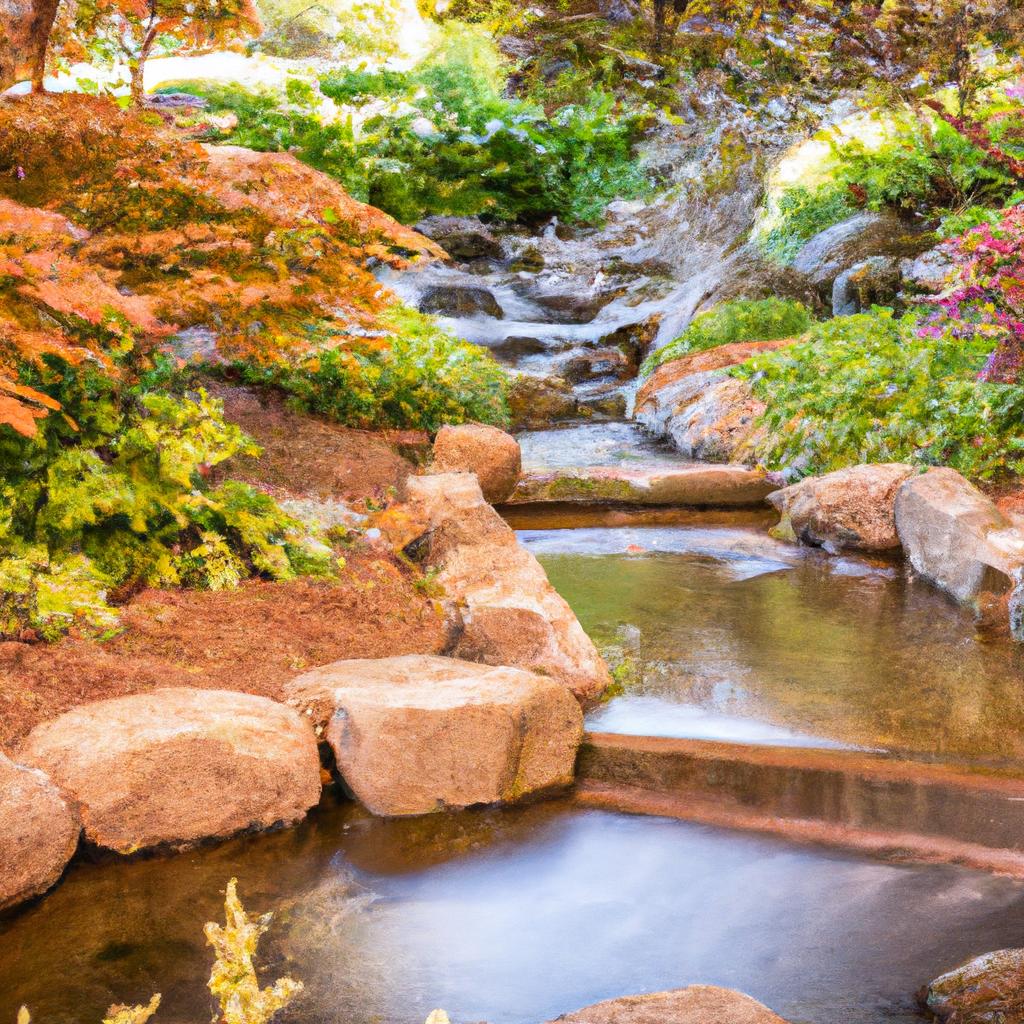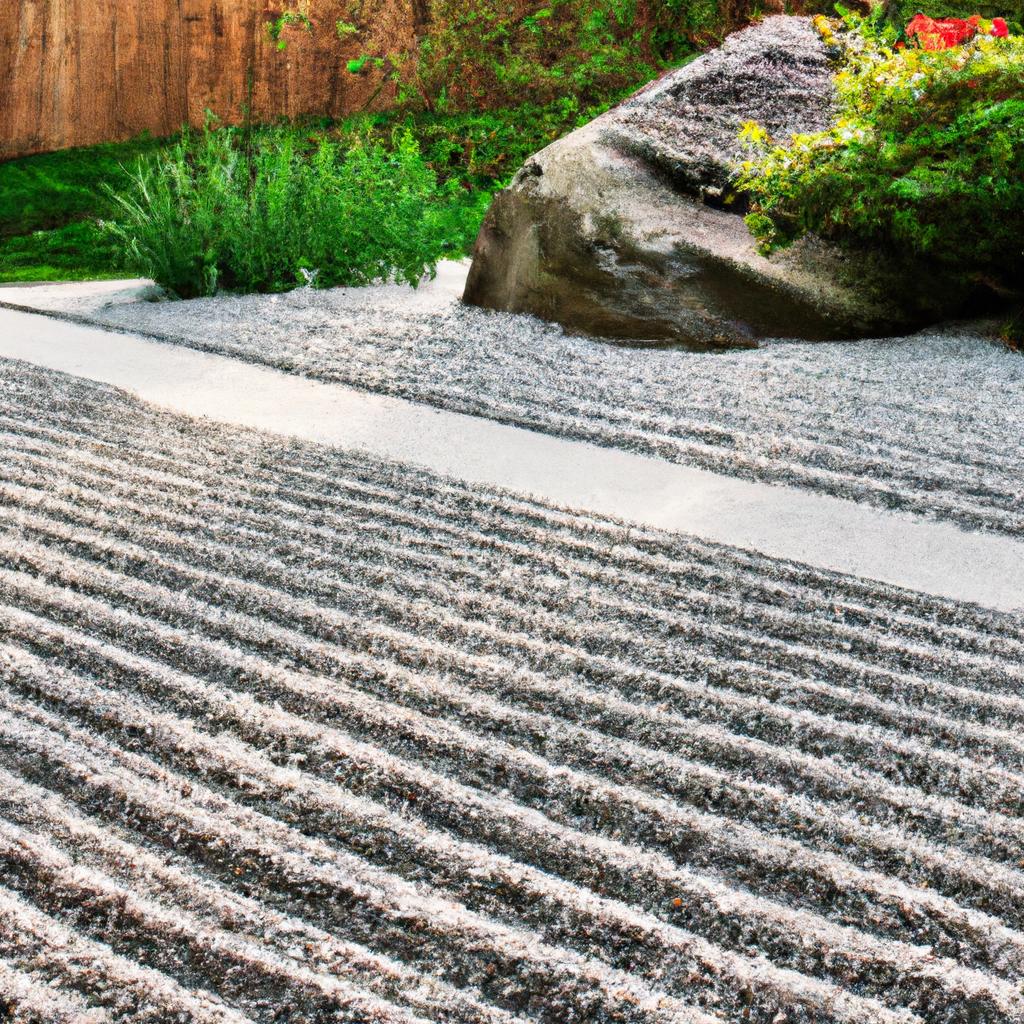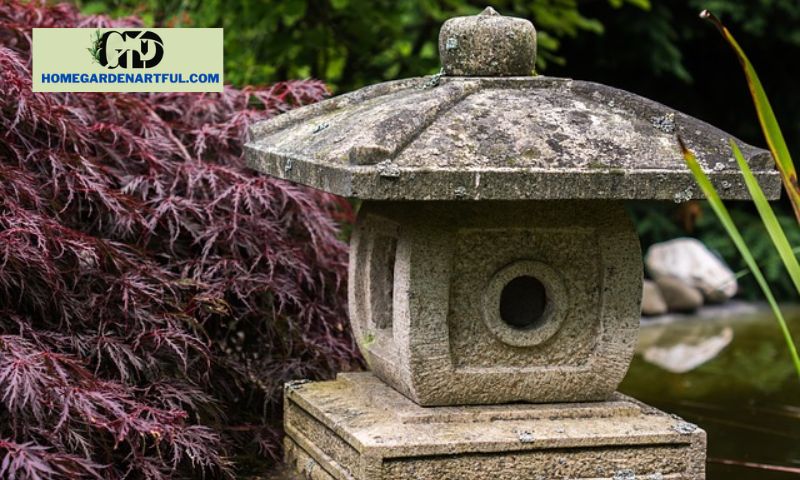Imagine stepping into a serene oasis where every element exudes peace and harmony. A feng shui zen garden offers just that – a sanctuary that promotes balance and tranquility in your outdoor space. In this article, homegardenartful.com will introduce you to the enchanting world of Feng Shui Zen Gardens, revealing their significance in creating a harmonious and peaceful environment. Let’s delve into the benefits of incorporating Feng Shui principles in garden design.
What is a Feng Shui Zen Garden?
A Feng Shui Zen Garden is a traditional Japanese garden that combines elements of nature and ancient design principles to create a serene and balanced space. Its purpose is to evoke a sense of tranquility, allowing you to escape the chaos of daily life and find inner peace. The garden’s design is meticulously planned to promote a harmonious flow of energy, known as “chi,” throughout the space.
The Significance of Feng Shui Principles
Incorporating Feng Shui principles in garden design goes beyond mere aesthetics. It harmonizes the energy within and around the garden, bringing a sense of balance and peace to the entire environment. By aligning with the natural elements, such as earth, water, wood, metal, and fire, a Feng Shui Zen Garden establishes a connection with the universe and enhances the overall well-being of its inhabitants.
Benefits of Incorporating Feng Shui in Garden Design
- Promotes Relaxation and Stress Relief: A Feng Shui Zen Garden provides a tranquil retreat where you can unwind, relax, and find solace amidst the chaos of modern life. Its carefully planned design and soothing elements can reduce stress levels and promote a sense of calmness.
- Enhances Energy Flow: The strategic placement of rocks, plants, and water features in a Feng Shui Zen Garden allows for the smooth flow of energy. This harmonious energy circulation revitalizes the space and brings a sense of renewal to both mind and body.
- Fosters Balance and Harmony: Feng Shui principles emphasize the harmonious coexistence of elements. A well-designed Zen Garden achieves a perfect balance of yin and yang energies, creating a harmonious environment that nurtures personal well-being.
- Improves Focus and Clarity: The serene ambiance of a Feng Shui Zen Garden helps declutter the mind and improve focus. By immersing yourself in this peaceful setting, you can enhance mental clarity and promote mindfulness.
- Invites Nature’s Healing Power: Connecting with nature has been proven to have numerous health benefits. A Feng Shui Zen Garden allows you to immerse yourself in the healing power of nature, which can boost your mood, reduce anxiety, and promote overall well-being.
In the next section, we will explore the fundamental principles of Feng Shui that contribute to the creation of a harmonious Zen Garden. Get ready to unlock the secrets of balance and tranquility in your outdoor space.
Understanding Feng Shui Principles

Feng Shui, an ancient Chinese practice, encompasses a set of principles that guide the design and arrangement of spaces to create a harmonious and balanced environment. When applied to garden design, these principles lay the foundation for a captivating Feng Shui Zen Garden. Let’s explore the key principles and understand their significance in cultivating balance, harmony, and energy flow within the garden.
The Key Principles of Feng Shui in Garden Design
1. Balance (Yin and Yang)
The concept of Yin and Yang is at the core of Feng ShuYin represents feminine, passive, and soft qualities, while Yang symbolizes masculine, active, and strong attributes. Achieving a harmonious balance between these two energies is essential in a Zen Garden. Incorporating elements like smooth stones (Yin) and upright plants (Yang) helps maintain equilibrium and creates a serene space.
2. Harmony with Nature
Feng Shui emphasizes the harmonious coexistence between humans and nature. By designing a Zen Garden that mirrors the natural landscape, you can establish a deep connection with the environment. Incorporate native plants, natural materials, and organic shapes to blend seamlessly with the surrounding ecosystem.
3. Energy Flow (Chi)
The flow of energy, known as Chi, is crucial in Feng ShuA well-designed Zen Garden ensures the smooth circulation of Chi throughout the space. Avoid blocking pathways or cluttering the garden with excessive elements. Instead, create curved paths and open spaces to allow energy to flow effortlessly, promoting a sense of tranquility and balance.
4. Five Elements
The five elements of Feng Shui – wood, fire, earth, metal, and water – play a vital role in garden design. Each element represents different energies and qualities. Integrate these elements thoughtfully, such as using rocks to represent earth, a water feature for water, and plants for wood. This incorporation fosters a harmonious balance and enhances the overall energy of the garden.
Importance of Balance, Harmony, and Energy Flow in Creating a Zen Garden
A Zen Garden aims to create a serene and balanced environment that promotes peace and tranquility. By adhering to the principles of balance, harmony, and energy flow, you can achieve this desired ambience. The careful placement of elements, such as rocks, plants, and water features, ensures a visual and energetic equilibrium. This balance reflects the interconnectedness of all things and fosters a sense of serenity within the space.
Harmony with nature is another vital aspect of a Zen Garden. By integrating natural elements and mirroring the surrounding landscape, you create a seamless transition between the garden and its environment. This harmonious coexistence not only enhances the aesthetic appeal but also cultivates a deeper connection with nature, promoting a sense of peace and well-being.
Energy flow, or Chi, is the life force that permeates everything. In a Zen Garden, the smooth circulation of Chi is essential to create a harmonious atmosphere. By designing open spaces, curved pathways, and unobstructed views, you allow energy to flow freely, revitalizing the space and creating a calming effect on the mind and body.
Understanding these principles sets the stage for designing a Feng Shui Zen Garden that radiates tranquility and balance. In the next section, we will explore the essential elements that constitute a captivating Zen Garden, unraveling their significance in creating a harmonious sanctuary.
Elements of a Feng Shui Zen Garden

In the realm of Feng Shui Zen Gardens, the elements play a crucial role in creating an environment that radiates harmony and tranquility. Let’s explore the essential elements that make up a traditional Zen Garden and discover how each one contributes to the overall balance and serenity of the space.
Rocks: Anchors of Stability
Rocks are the backbone of a Feng Shui Zen Garden, symbolizing strength, stability, and endurance. Carefully selected and strategically placed, rocks act as anchors that ground the energy and establish a sense of stability within the garden. These natural formations not only add visual interest but also serve as focal points, guiding the flow of chi throughout the space.
Gravel: Ripples of Serenity
Gravel, often represented as raked sand or crushed stones, symbolizes water and creates a serene and meditative atmosphere in a Zen Garden. The raked patterns mimic the gentle ripple effect of water, evoking a sense of tranquility and calmness. Gravel also serves a practical purpose by providing a low-maintenance ground cover that allows for proper drainage.
Water Features: Flowing Harmony
Water is an essential element in Feng Shui, representing wealth, abundance, and the flow of energy. Incorporating water features, such as small ponds, streams, or fountains, adds a sense of movement and vitality to the Zen Garden. The gentle sound of flowing water enhances relaxation and promotes a peaceful ambiance, while also attracting positive energy and prosperity.
Plants: Living Energy
Plants breathe life into a Feng Shui Zen Garden, infusing it with vibrant energy and natural beauty. Choose plants that thrive in your climate and align with the principles of Feng ShuConsider incorporating evergreens, bamboo, or bonsai trees for their symbolic meanings and ability to create a harmonious balance between the elements. Plants not only purify the air but also create a sense of connection with nature, promoting a soothing and nurturing environment.
By carefully selecting and arranging these elements, a Feng Shui Zen Garden becomes a harmonious sanctuary that embraces the principles of balance and tranquility. In the next section, we will explore the art of designing a Zen Garden using Feng Shui principles, unveiling the secrets of creating a space that exudes serenity and positive energy.
Designing a Feng Shui Zen Garden
Tips and Guidelines for Designing a Feng Shui Zen Garden
When it comes to designing a Feng Shui Zen Garden, attention to detail is key. Every element you incorporate plays a significant role in creating a harmonious and tranquil space. Here are some tips and guidelines to help you design your own Zen Garden:
1. Balance and Symmetry: Achieving balance and symmetry in your garden design is crucial. Use the principles of yin and yang to create a harmonious flow of energy. For example, if you have a large rock on one side, balance it with a smaller rock or a carefully positioned plant on the other side.
2. Element Placement: Pay attention to the placement of elements in your garden. Position rocks strategically to represent mountains, symbolizing stability and protection. Place water features, such as a small pond or a flowing fountain, to promote the flow of positive energy.
3. Colors and Materials: Opt for a calming color palette when selecting plants and materials for your Zen Garden. Earthy tones like greens, browns, and greys provide a soothing backdrop. Incorporate natural materials such as wood, stone, and bamboo to create an authentic and grounding atmosphere.
4. Pathways and Flow: Design pathways that guide you through the garden, creating a sense of exploration and tranquility. Curved paths and stepping stones can add a gentle flow and encourage a mindful stroll.
Symbolism in Garden Design
Symbolism plays a significant role in Feng Shui Zen Gardens. By incorporating meaningful symbols, you can enhance the energy and create a deeper connection with nature. Here are some symbolic elements you can include in your garden design:
1. Bonsai Trees: Bonsai trees represent harmony, balance, and longevity. Their miniature size and meticulous pruning symbolize the beauty of nature and the art of patience.
2. Lanterns: Lanterns serve as a symbol of enlightenment and spiritual guidance. Place them strategically in your Zen Garden to create a warm and inviting ambiance, especially during evening hours.
3. Bamboo: Bamboo is a versatile and resilient plant that represents strength and flexibility. Incorporate bamboo in your garden to symbolize growth, adaptability, and protection against negative energy.
4. Zen Statues: Zen statues, such as Buddha or Koi fish, are common in Feng Shui Zen Gardens. They serve as focal points and evoke a sense of tranquility and enlightenment.
By incorporating these symbolic elements into your garden design, you can infuse your space with deeper meaning and intention, further enhancing the positive energy flow.
In the following section, we will explore the essential steps to maintain a Feng Shui Zen Garden, ensuring its longevity and continued serenity. Let’s dive into the art of garden maintenance and nurturing.
Maintaining a Feng Shui Zen Garden
Essential Steps for Garden Maintenance
To preserve the harmonious energy and serenity of your Feng Shui Zen Garden, it is crucial to follow a regular maintenance routine. Here are some essential steps to keep your garden in optimal condition:
1. Regular Cleaning: Maintaining cleanliness is vital to uphold the positive energy in your Zen Garden. Clear away fallen leaves, debris, and any clutter that may disrupt the flow of chRegularly rake and groom the gravel or sand to maintain its pristine appearance.
2. Pruning and Trimming: Trim overgrown plants and shrubs to ensure they retain their desired shape and size. By keeping the vegetation in check, you maintain the visual balance and prevent any obstruction of energy flow within the garden.
3. Water Feature Care: If your Zen Garden includes a water feature, such as a small pond or a flowing stream, it requires proper care. Regularly clean the water, removing any debris or algae. Ensure that the water is flowing smoothly and that the pump or filtration system is functioning optimally.
4. Proper Energy Flow: Pay attention to the energy flow within your garden. Observe how the wind moves through the space and adjust any barriers or obstructions that may hinder its path. Keep pathways clear and ensure that the energy can freely circulate throughout the garden.
Nurturing Plants for Balance and Harmony
Plants play a crucial role in maintaining the balance and harmony of a Feng Shui Zen Garden. Here are some tips to nurture your plants and cultivate an atmosphere of tranquility:
1. Choose Suitable Plants: Select plants that thrive in your climate and are well-suited for the specific environment of your Zen Garden. Consider incorporating plants with rounded or soft-shaped leaves, as they are believed to promote a gentle and calming energy.
2. Maintain Healthy Plants: Regularly inspect your plants for any signs of disease, pests, or nutrient deficiencies. Provide proper watering, sunlight, and fertilization according to the specific needs of each plant. Healthy plants contribute to the overall well-being and energy of the garden.
3. Balance Yin and Yang: Achieve a harmonious balance by incorporating a variety of plant types, representing both yin and yang energies. Mix plants with soft, flowing forms (yin) with those that have more upright, structured growth (yang). This balance creates a visually pleasing and energetically balanced garden.
4. Mindful Plant Placement: Consider the placement of plants in your Zen Garden. Use plants to frame and direct energy, guiding it to flow smoothly throughout the space. Place taller plants towards the back or sides, while shorter plants can be positioned towards the front or center to create depth and visual balance.
By following these maintenance and nurturing practices, you can ensure that your Feng Shui Zen Garden remains a serene sanctuary, promoting balance, harmony, and positive energy. As we conclude our exploration, let’s reflect on the remarkable benefits that a well-designed and maintained garden can bring to our lives.
Conclusion: Cultivating Harmony and Peace in Your Outdoor Haven
Embrace the art of Feng Shui Zen Garden design and transform your outdoor space into a haven of tranquility. By incorporating the principles of Feng Shui, you can create a harmonious environment that nurtures your well-being and promotes a sense of peace.
Throughout this article, we’ve explored the essence of a Feng Shui Zen Garden and its significance in creating a harmonious and peaceful atmosphere. From understanding the key principles of Feng Shui to exploring the essential elements and design techniques, you now have the knowledge to embark on your own Zen Garden journey.
Remember, a well-designed and maintained Feng Shui Zen Garden can have a profound impact on your well-being. It provides a sanctuary where stress melts away, focus is sharpened, and inner peace is cultivated. Allow the gentle flow of energy and the healing power of nature to envelop you in a blissful embrace.
So, why not embark on this transformative journey and create your very own Feng Shui Zen Garden? Immerse yourself in the serenity of carefully placed rocks, the soothing sound of flowing water, and the vibrant energy of lush greenery. Let your garden become a reflection of your inner harmony, a space that rejuvenates and inspires you.
Remember, as you embark on this journey, always trust your intuition and allow your creativity to flourish. Create a space that speaks to your soul, where you can find solace and reconnect with nature’s healing energies. Embrace the balance, embrace the tranquility, and let your Feng Shui Zen Garden become a testament to the beauty of harmony.
Now, go forth and create your own little oasis of calmness. Unlock the secrets of Feng Shui, and let your garden be a sanctuary that brings you closer to nature and inner peace.
“In nature, nothing is perfect and everything is perfect. Trees can be contorted, bent in weird ways, and they’re still beautiful.” – Alice Walker
In the world of Feng Shui Zen Gardens, imperfections are embraced, and beauty is discovered in the balance of natural elements.


